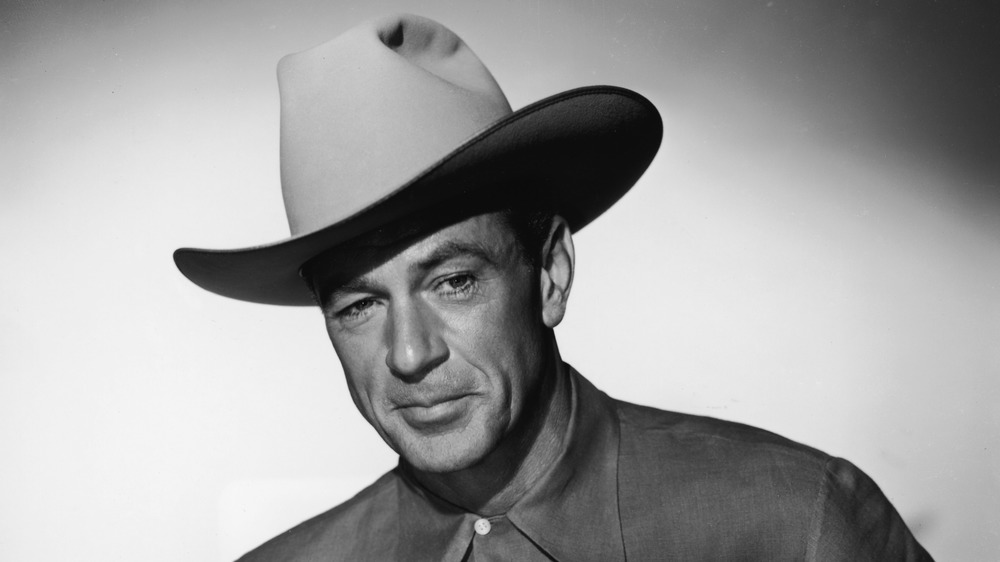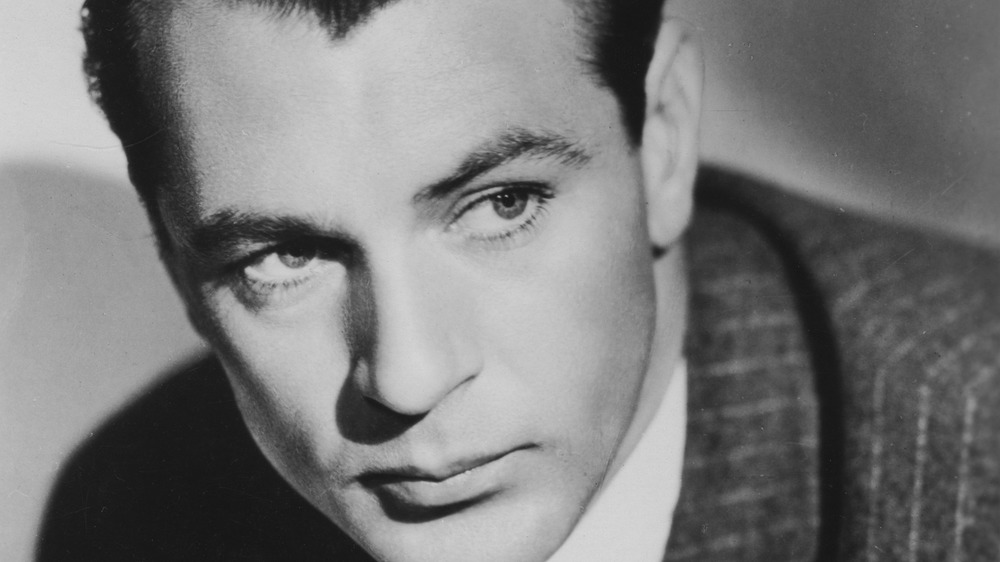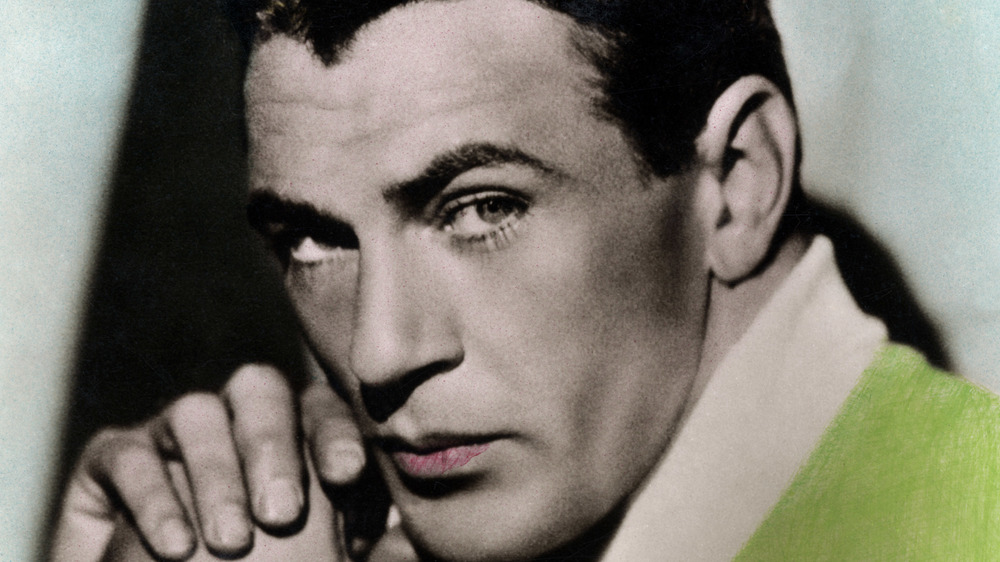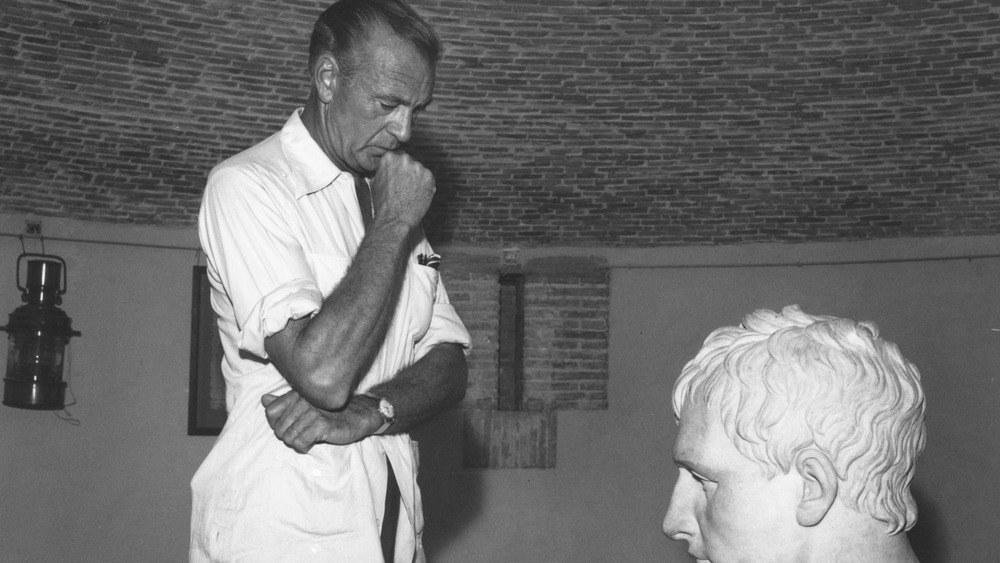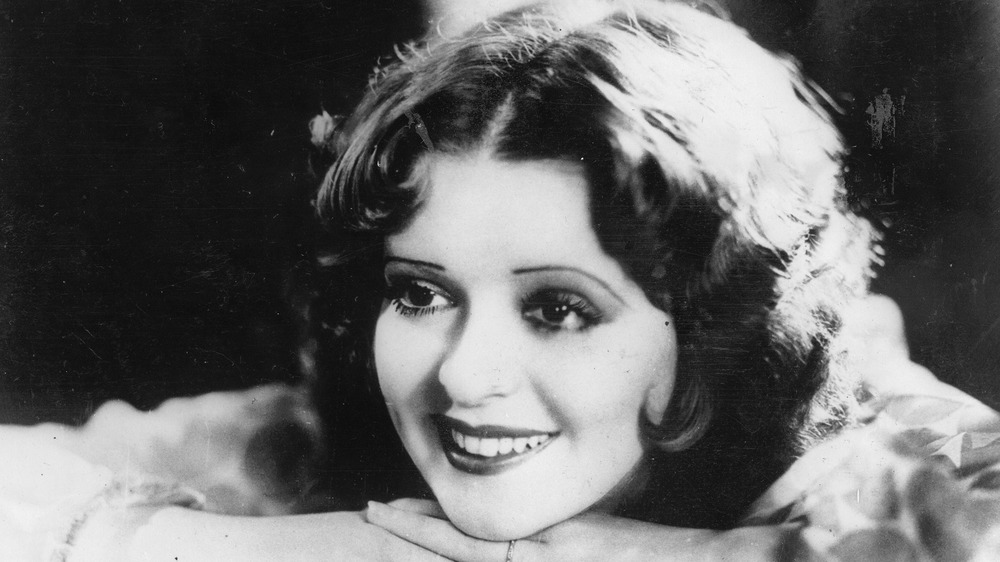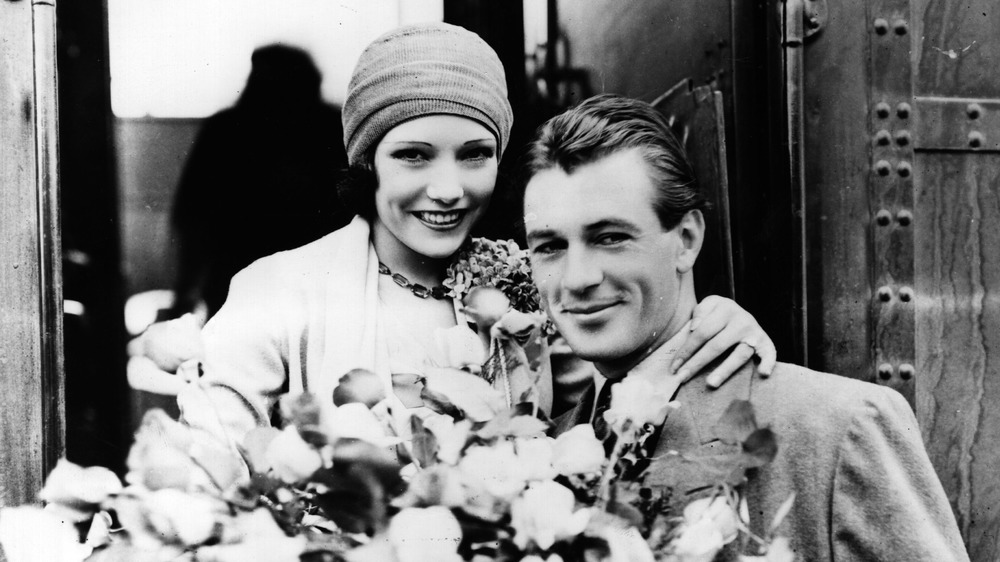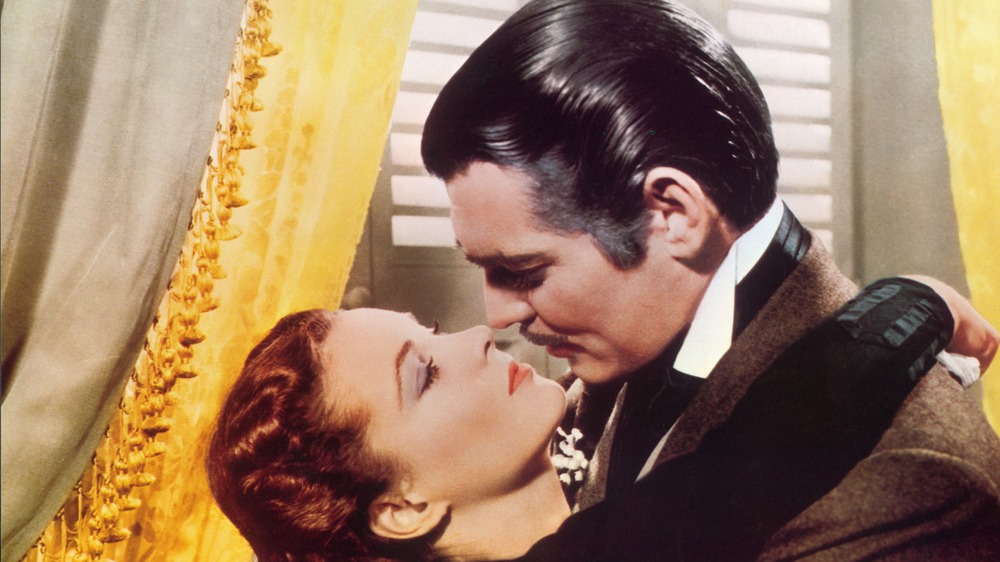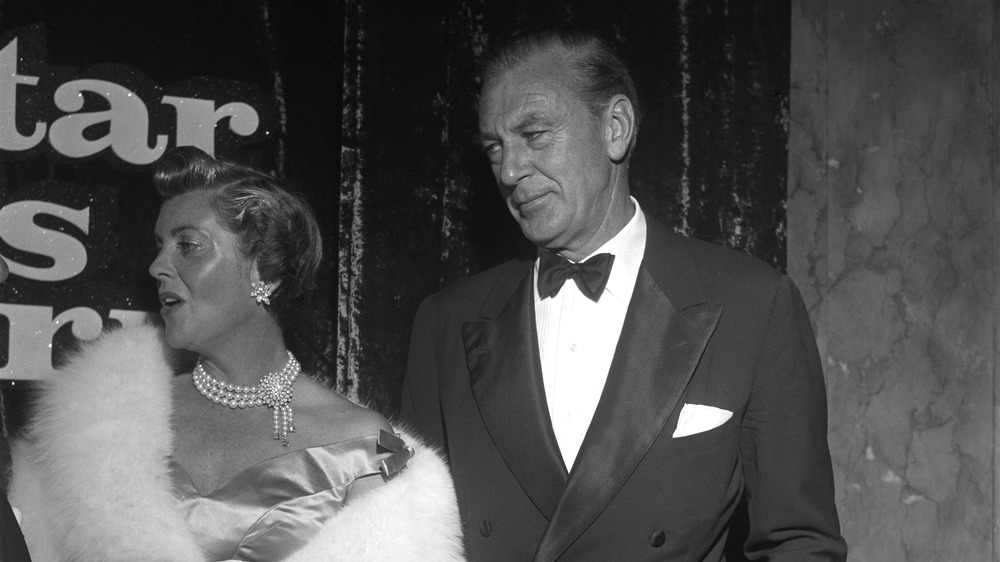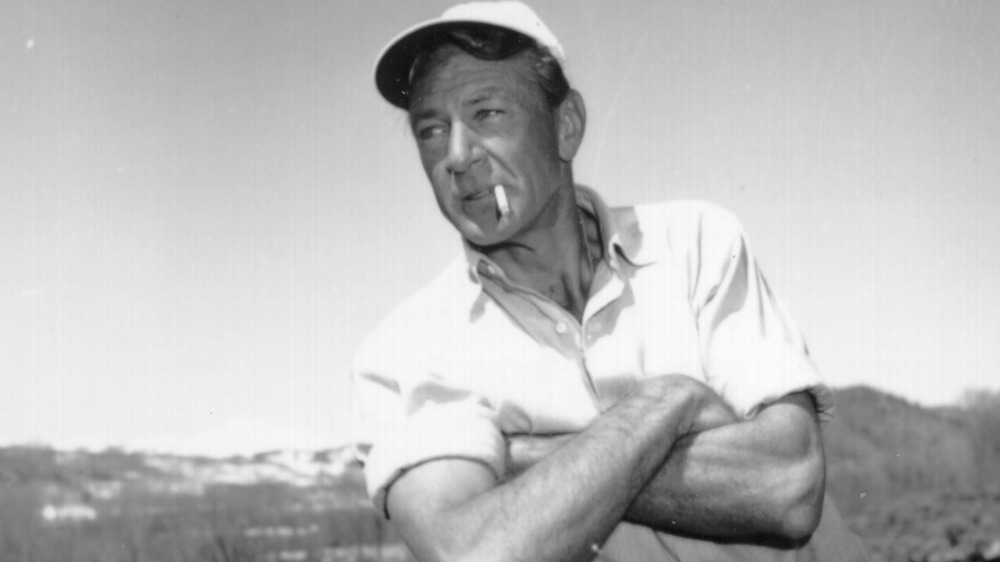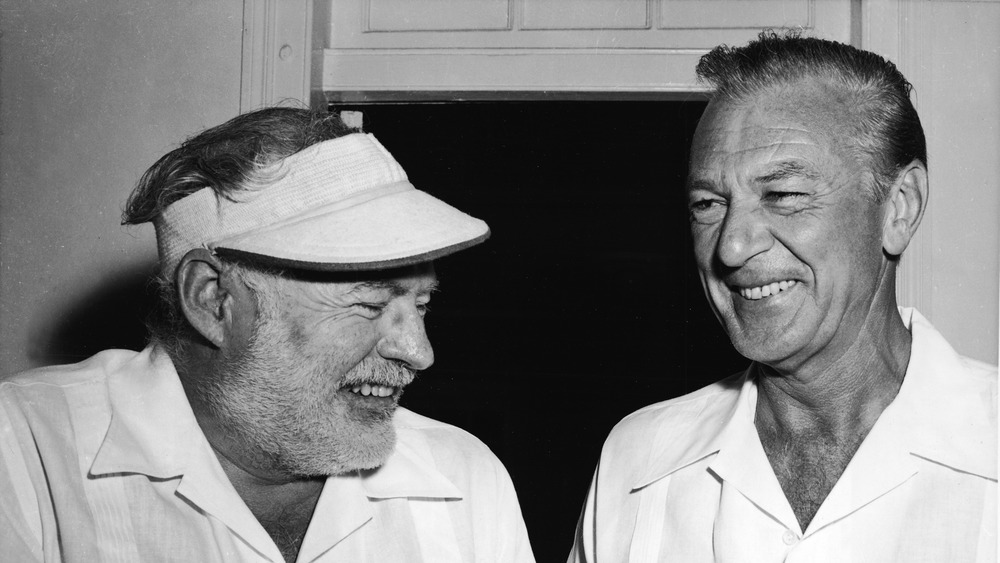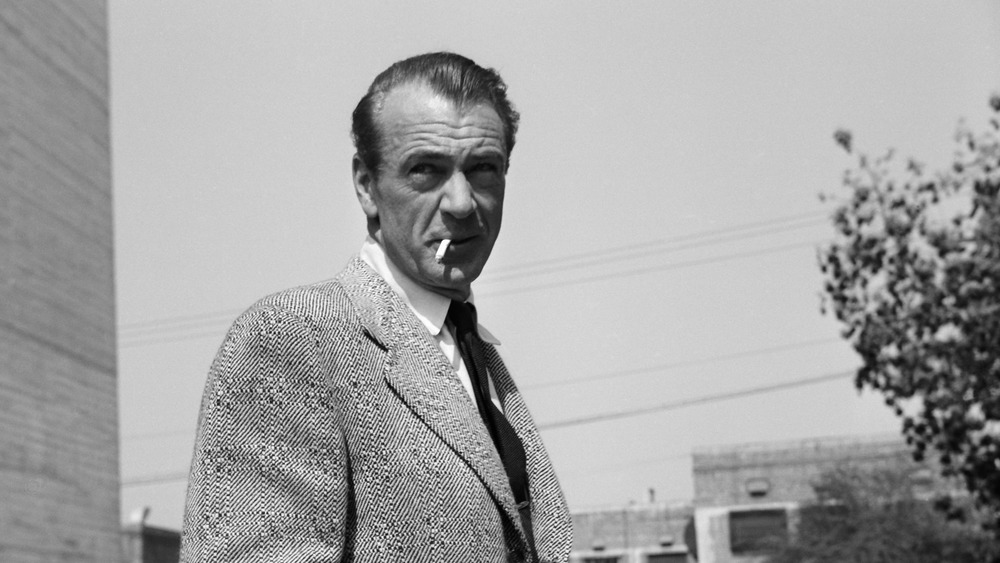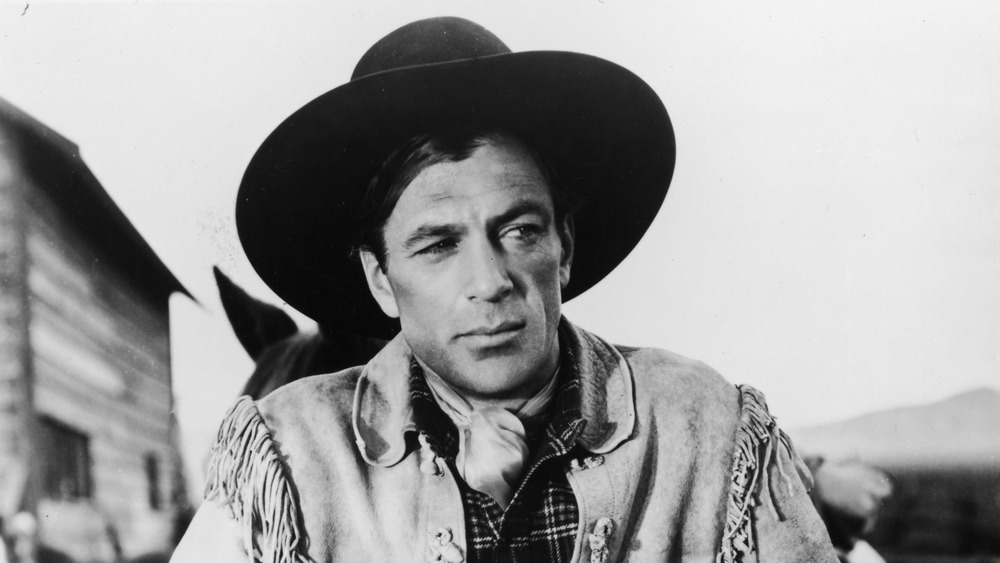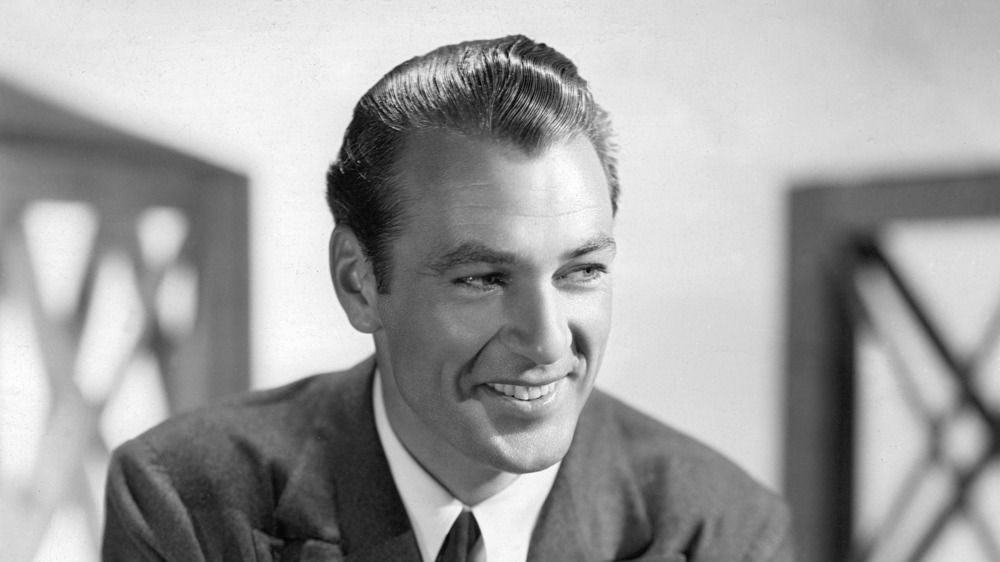The Untold Truth Of Gary Cooper
Gary Cooper will forever be remembered as the all-American movie cowboy — the consummate good guy, the noble hero, the deliverer of justice. That was his classic image. Cooper has undoubtedly left his mark on American culture — besides his Old West good guy persona, he's actually the reason why any male today has the first name "Gary."
He got his start as a Hollywood stuntman and screen extra, was elevated to silent movie star, and was able to make the massive leap into "talkies" — and not all silent movie actors would survive that transition. And really, the shift to talkies made him an even bigger star than before — it was those movies where he was able to refine his manly, rugged, all-American image that the public came to adore. But underneath all that cowboy swagger, Cooper had a lot simmering underneath the surface. This is the untold truth of Gary Cooper.
Gary Cooper's parents were British immigrants
He might have been the rough and tough all-American cowboy in his films, but Gary Cooper's parents were originally from England. Charles Henry Cooper and Alice Brazier Cooper emigrated to the United States and bought a massive ranch in Montana. As noted by History.com, in addition to being a wealthy ranch owner, Charles Cooper would also be elected to the Montana Supreme Court. Born Frank James Cooper in Helena, Mont., it was on his family's vast ranch that he learned how to ride horses, hunt, and fish — all in all, he had plenty of early training for those Western films he would one day star in.
Although he and his brother were born and raised in Montana, Cooper's parents thought that the boys would benefit from having an English education and sent their sons abroad for their schooling for a few years. They would eventually return home and enroll in American schools around 1912. According to The Los Angeles Times, by the time Cooper returned home to the states at 13, he actually spoke with an English accent for a while.
Gary Cooper survived a car crash
At the age of 15, Gary Cooper was involved in a serious car accident that resulted in a broken hip. His doctor recommended that Cooper try horseback riding as a type of physical therapy to help him heal. While Cooper did recover from the accident, his imperfectly healed hip meant that he would always walk with a limp for the rest of his life. That limp would always be with him in every film.
However, it could be argued that Cooper was actually able to use his minor injury to his advantage — particularly in his Western movies. According to The Los Angeles Times, Cooper would use that limp to create his signature strut — slightly bow-legged, slow, and deliberate, Cooper's walk was ideal for creating the image of an intimidating movie cowboy. Along with his horseback riding and outdoorsmen skills, it's no wonder that Cooper is automatically thought of as the pinnacle depiction of the classic movie American Westerner.
Gary Cooper was originally interested in art
Oddly enough, Gary Cooper's initial career plan was in the visual arts — and he did show some promising talent in sketching and watercolor painting. He even enrolled at Grinnell College in Iowa to study art from 1922 to 1924. Eventually, as noted by The Los Angeles Times, Cooper found that he could earn more money working in Los Angeles as a stuntman and as a screen extra.
At first, Hollywood dismissed him, deeming Cooper "too bashful." He later got an agent named Nan Collins to help him in finding work — and it was Collins who suggested that Cooper change his first name from "Frank Cooper" to "Gary Cooper." According to The Telegraph, evidently, Collins was inspired to suggest the name of her old hometown, Gary, Ind. And it was unusual since "Gary" wasn't a first name that existed at that time. But it certainly worked for him. Cooper was able to get work, and his big break came in the form of a leading part in the 1926 silent film, The Winning of Barbara Worth, which led to him getting a long-term contract with Paramount.
Although Cooper's career went in a completely different direction than he originally anticipated, his daughter, Maria Cooper Janis, actually went on to become a renowned artist, exhibiting her paintings in the United States and Europe.
Clara Bow boosted Gary Cooper's career
As noted by The New York Times, movie star Clara Bow was undoubtedly the biggest "It Girl" of the silent film age during the 1920s, so her opinion held a considerable amount of sway. After Bow acted alongside Gary Cooper in the 1927 film, Children of Divorce, she was absolutely smitten — both with his acting and his sex appeal. Bow insisted that Cooper should be cast in her 1927 movie, Wings — albeit on a very small part. And it's been widely rumored that the two were very likely lovers off the screen as well as on it. But their star power was hot too — Wings was a hit and became the very first Oscar winner for "Best Picture."
Unlike Cooper, Bow sadly never was able to make the transition from silent films to "talkies." While a talented performer on the screen, her harsh Brooklyn accent is usually cited as the cause of her acting career's demise. But Cooper went on to have a long and prosperous film career, and Bow probably helped give him that push in the right direction.
Gary Cooper had a long list of lovers
Clara Bow wasn't the last of Gary Cooper's lovers. A noted ladies' man, Cooper got around in Hollywood. And his list of lovers was an extensive one. His lovers included actresses and co-stars, such as Marlene Dietrich, Carole Lombard, Ingrid Bergman, and Grace Kelly, among others. Cooper was married to socialite Veronica Balfe with whom he had a daughter, Maria. But marriage didn't put a damper on any of his affairs. The Telegraph noted that Cooper's womanizing ways were no secret, certainly not to director Howard Hawks who always could tell when Cooper was on the prowl.
"If I ever saw him with a good-looking girl and he was kind of dragging his feet over the ground and being very shy and looking down, I'd say, 'Oh-oh, the snake's gonna strike again,'" said Hawks.
One of Cooper's most notable lovers was Mexican actress Lupe Velez — the two had a particularly turbulent affair. Not only did Cooper's mother and Velez despise each other, but according to Los Angeles Magazine, Velez once stabbed Cooper with a kitchen knife during an argument. And another time, she tried to shoot Cooper while he was boarding a train. What was most surprising was that the relationship lasted three years with Cooper still intact.
In his later years, Cooper had a lengthy affair with Fountainhead co-star Patricia Neal — he was 46 when they met, and she was 21. Cooper did legally separate from his wife for a while and nearly married Neal but ultimately returned to Balfe.
Gary Cooper could have starred in Gone With The Wind
Clark Gable was a swoon-worthy choice for the role of Rhett Butler in Gone With The Wind. But Gary Cooper could have easily been cast. As noted by The Vintage News, David O. Selznick approached Cooper personally about taking the role of Rhett Butler — he was Selznick's first choice. It's not hard to see why. Although it's difficult to imagine anyone other than Gable as Rhett Butler, with Cooper's charm, suave, and sex appeal, Cooper would certainly appear to be an ideal Rhett on all counts.
Cooper had no interest whatsoever in the role or the movie. He was convinced that Gone With The Wind would completely bomb and wanted no involvement in the picture. Cooper, however, apparently did give his wholehearted approval of Gable being the second choice for Rhett Butler, as he was quoted to say, "Gone With The Wind is going to be the biggest flop in Hollywood history. I'm glad it'll be Clark Gable who's falling flat on his nose, not me."
Gone With The Wind would go on to win eight Academy Awards, including "Best Picture."
Gary Cooper converted to Catholicism
Although Gary Cooper was raised Episcopalian, his wife and daughter were both Catholic. Over the years, Cooper's numerous affairs, especially his relationship with Patricia Neal, took a heavy toll on his family life. According to Forbes, in addition to his family's emotional distress during his affair with Neal, Cooper was also suffering from ulcers. Neal became pregnant and had an abortion. The strain was becoming too much. Cooper ended the relationship and returned to his family. They took a European trip together, a publicity tour for his latest film, High Noon. One of their stops was at the Vatican for a private audience with the Pope. It would appear that this meeting with the pope helped stir Cooper's initial interest in Catholicism.
But it wasn't an automatic conversion, though — Cooper still had lapses in his fidelity. Eventually, Cooper wanted to make more of an effort in his marriage and stop putting himself and his family through more emotional distress. He started to attend Catholic Mass more regularly with his wife and daughter and felt moved spiritually. He reasoned that "a little religion wouldn't do him no hurt" and decided to convert to Catholicism officially. Cooper was formally admitted into the Catholic Church in 1959. His daughter, Maria, insisted that her mother played no part in her father's decision to become a Catholic.
"It wasn't knocking him over the head. Because, believe me, no one made my father do what he didn't want to do," she said.
Gary Cooper hesitated to take the role of Lou Gehrig
One of Gary Cooper's famous roles was in the 1942 film, Pride of the Yankees, where he played Lou Gehrig, who died of ALS in 1941. When Cooper was first offered the part, he was hesitant to accept. He didn't know anything about baseball and had no interest in the sport. He was also already 40 — three years older than Gehrig was when he passed away. It wasn't until Gehrig's widow, Eleanor Gehrig, expressed her desire for Cooper to play her husband that he decided to accept the role.
Again, Cooper went into this role with absolutely no knowledge of baseball — he would have to learn from scratch. According to The Washington Post, Cooper went into rigorous training with former all-star, Lefty O' Doul. Cooper's efforts with baseball were not exactly impressive. O'Doul certainly aimed some harsh criticism at Cooper, saying, "You throw a ball like an old woman tossing a hot biscuit."
Cooper did improve his game enough to look authentic, even more so when Brooklyn Dodgers star, Babe Herman, was brought in to be Cooper's movie double. But the film was a hit, and outside of his less-than-stellar baseball skills, Cooper nailed the part of Gehrig. In a letter to Eleanor Gehrig, writer Paul Gallico noted Cooper's performance, saying "Lou seems to have become more Gary Cooper than Lou Gehrig."
Gary Cooper was good friends with Ernest Hemingway
One was a great American novelist and the other a renowned American actor. Together, they would forge a friendship that would span 20 years. According to The New York Times, before even meeting, Gary Cooper starred in the 1932 movie adaptation of Ernest Hemingway's novel, A Farewell To Arms – and Hemingway was impressed. The two wouldn't officially meet each other until 1940 in Idaho.
Oddly enough, the men bonded — a surprise, because Cooper and Hemingway were quite the polar opposites in many ways (via the Idaho Statesman). Hemingway was loud, rambunctious, loved his drink, and occasionally enjoyed a good fight. Cooper was solemn, taciturn, a moderate drinker, and shied away from conflict. While Hemingway was a voracious reader and novelist, Cooper barely picked up a book unless it was a movie script. But the two were great outdoorsmen and mutually enjoyed hunting and fishing together.
When For Whom The Bell Tolls was to be made into a movie in 1943, Hemingway insisted that Cooper be cast in the lead role. The two friends also started to experience health declines roughly around the same time in 1961. Cooper physically and Hemingway mentally. Less than two months after Cooper died of cancer, Hemingway died after committing suicide.
If you or anyone you know is having suicidal thoughts, please call the National Suicide Prevention Lifeline at 1-800-273-TALK (8255).
Gary Cooper played a role in the Hollywood blacklist
Gary Cooper was famously opposed to communism and helped co-found the Motion Picture Alliance for the Preservation of American Ideals, a right-wing organization dedicated to keeping any trace of communism and fascism out of film. And Cooper was no stranger to turning down scripts if he thought they were too left wing for his tastes or thought he caught a whiff of communism in the story — he testified as much during a Red Scare hearing, as noted by the Library of Congress.
However, despite his conservative leanings, according to Vanity Fair, Cooper did indeed support his friend and High Noon screenwriter Carl Foreman, who was accused of communism and called before the House Un-American Activities Committee. Foreman had indeed been a member of the Communist Party in 1938 but had quit in 1943.
Cooper had great respect for Foreman's talents as a screenwriter and fully believed that he was no longer a Communist Party member. Cooper was even willing to testify on Foreman's behalf, except his lawyer advised against it — likely fearing that Cooper could find himself blacklisted. Although Foreman had long since ceased to be a party member, he was still subpoenaed and asked to give up others' names in the party, which Foreman adamantly refused to do. Ultimately, Foreman was blacklisted by Hollywood and eventually emigrated to England. But Cooper still fought for Foreman to receive onscreen credit for High Noon and other films.
Gary Cooper always wanted to be the good guy
Gary Cooper is best known for always playing the noble hero character — always the good guy. And he liked it that way. Whenever a screenwriter was crafting a new character for Cooper, Cooper would urge the writer to make sure that his character got to be the hero. Cooper always said he preferred playing characters that exemplified a man's best qualities — and he felt that Western films emphasized these traits. There was always a good guy and a bad guy in the old, classic Western films — and the good guy always won. In that respect, the films were very black and white. But Cooper loved them.
According to Forbes, when asked in 1959 why he did so many Western movies, Cooper responded, "I like Westerns because the good ones are real. You feel real when you make them... we are brought close to the pioneer people by seeing the Western picture and... realize that our country was and is full of people who believe in America."
Cooper's daughter, Maria Cooper Janis, likewise recalled her father's love of playing the hero in his movies, saying, "He always said he wanted to make films that showed the best a man could be."
Gary Cooper struggled with cancer
Gary Cooper eventually began to decline significantly in 1960. He had long-suffered from ulcers, but the problem was much more serious — this time it was cancer. According to The Chicago Tribune, in 1960, Cooper had a prostate operation, and five weeks later he had a cancerous part of his colon removed. He did his best to conceal from others just how severe his illness was and kept a low profile, but people were starting to notice Cooper's prolonged public absences — it was obvious that something was very wrong.
As much as Cooper and his family hoped the surgeries would help, the cancer had spread to his lungs and bones. The pain was intense, and Cooper needed powerful drugs for relief. Cancer had absolutely wasted his once strong, rugged, 6-foot-3-inch frame. Cooper died in 1961 at the age of 60, with his wife, daughter, doctor, and family priest by his side.
One month before his death, Cooper received an honorary Oscar at the 1961 Academy Awards. Cooper was unable to attend due to his illness, so his friend, Jimmy Stewart, accepted the award on his behalf. As Stewart accepted his friend's award, he slightly lost his composure and became teary-eyed. "We're very, very proud of you, Coop. All of us are tremendously proud," he said.
